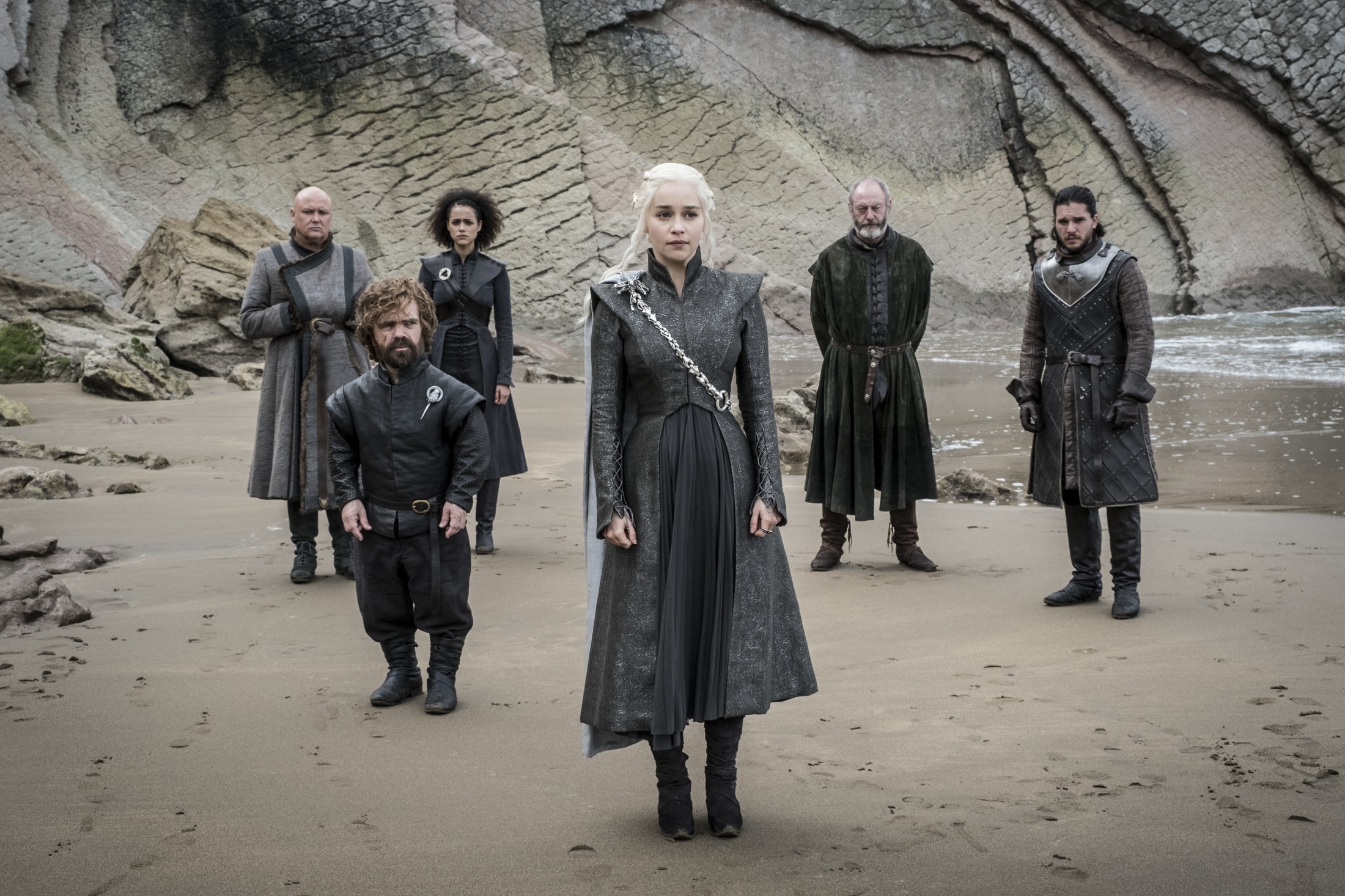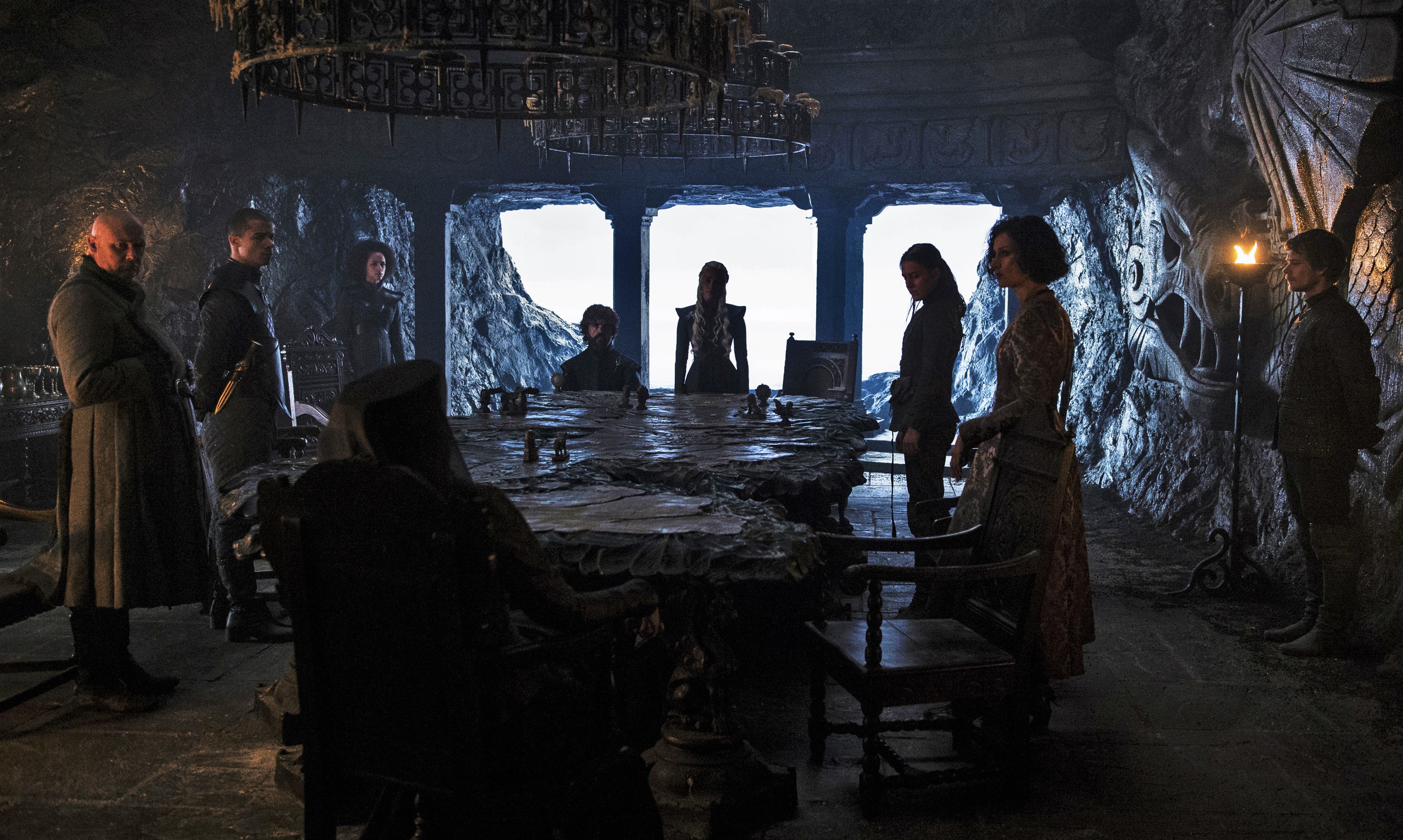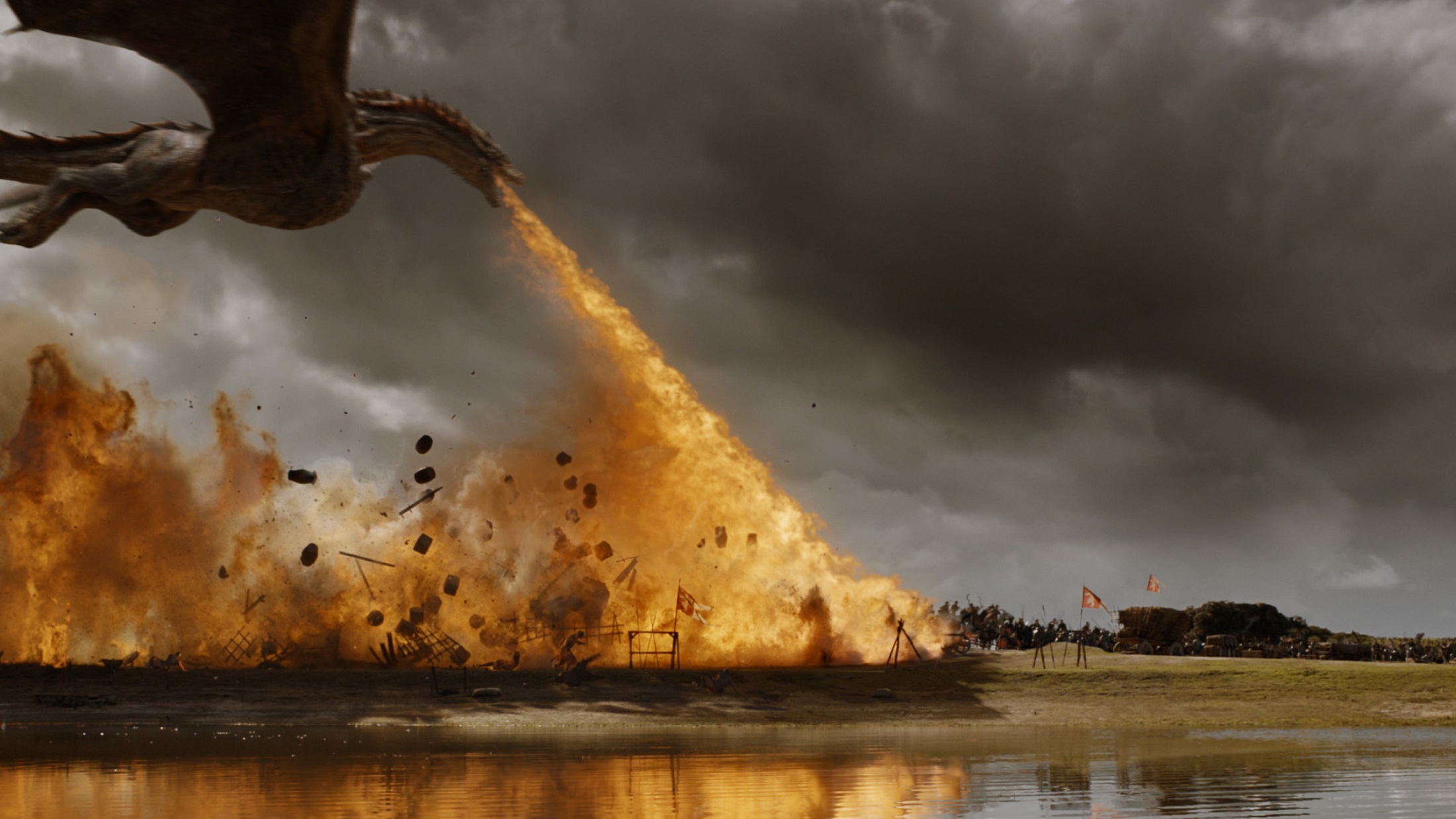Valar Morghulis!
This weekly column analyzes a particular scene or two from each episode that highlight the importance of writing within storytelling. The scenes will be discussed at length and analyzed with character and overall narrative beats for the television show and the books when appropriate.
A telling piece of writing in “The Spoils Of War” is when Daenerys Targaryen (Emilia Clarke) is looking out at her dragons flying beyond the shores of Dragonstone. It is a moment that is likely to be forgotten in the wake of fan-favorite sequences such as Arya’s (Maisie Williams) delightful sparring with Brienne (Gwendoline Christie) in Winterfell and Drogon roasting thousands of Lannister soldiers like chunks of meat. The writing of that moment nevertheless stuck in my mind as a critical encapsulation of the primary struggle Daenerys has faced as a character.
A primary writing motif on Game Of Thrones is an understanding that we as individuals often face significant internal conflicts as we try and come to an understanding of who we really are. Daenerys was raised as an object, the key to unlocking the secret door to the Iron Throne for Viserys (Harry Lloyd). Viserys proved himself to be utterly incompetent and a new destiny opened up at Daenerys’s feet. The assassination attempt in the markets solidified her desire to latch onto that destiny and become the dragon her brother could never be.
The demise of Khal Drogo (Jason Mamoa) set her back but the birth of her dragons gave her a new lease on her journey to reclaiming the Iron Throne. Having traversed the treacherous Red Waste, she arrived in the great city of Qarth. The greatest city that ever was or would ever be, however, proved to be little more than a poisonous trap. Nevertheless, she garnered enough gold to buy a ship that would take her and her remaining khalasar to the slave city of Astapor.
In Astapor, Daenerys uttered her most infamous “Dracarys” and proceeded to slaughter the Astapori aristocracy and take the Unsullied. Her forces defeated the Yunkish and then in Meereen, she faced her greatest challenge yet. Daenerys had enough wherewithal to comprehend that unlike her brother Viserys, she did not wholesale believe that commoners across Westeros were praying for her safe return. She believed, on the welcome advice of Jorah (Iain Glen) and Barristan Selmy (Ian McElhinney), that she had to offer the people of Westeros something before they could ever turn around and support her. She had to become more worthy than Robert (Mark Addy). In other words, she had a responsibility to learn before she could claim the right to rule.
Daenerys has always been defined by the delineation of responsibilities. She has felt a responsibility towards Meereen but a part of her, whether she wanted to acknowledge it or not, understood that the more she attached herself towards this city she had conquered, the farther she would be driven from her mission of conquering Westeros. Drogon’s rescue of her in Daznak’s Pit and her burning of the temple in Vaes Dothrak served as critical junctures for her to embrace her Targaryen heritage but that in and of itself came with its own set of responsibilities.
When Daenerys arrives on the shores of Dragonstone, she is accompanied by the baggage of the crimes her father had committed. “The daughter of the Mad King cannot be trusted” is a line Cersei (Lena Headey) used to great effect in swaying Westerosi nobles to her side but it is also a note that Daenerys has mentally confronted ever since she realized who the Mad King was. Every move of hers has that understanding echoing quietly in the background. Whether or not that is specifically said out loud, the writing and Emilia Clarke’s performance makes it quite clear that that sullied family history is weighing heavily on her mind.
If Daenerys had wanted to, she could have taken her armada, her three grown dragons, and her armies to sack King’s Landing. The city would have fallen and the only question would have been in regards to just how quickly the city would surrender. Cersei would likely have been executed and the lion’s banner would have been replaced by the three-headed dragon. In the show’s timeline with the pacing of this season, this would have happened by the end of the second episode. It is indeed what Yara Greyjoy (Gemma Whelan), Ellaria Sand (Indira Varma), and Olenna Tyrell (Diana Rigg) argued in favor of. Yet that is not the case.
Daenerys is acutely aware that she wants to avoid becoming the Mad King. There are certain moments where she has gone in that direction, but there has always been a purpose behind those actions. Regardless of whether or not one agrees with her methods in those specific circumstances, they are not the marker of someone who does not have an acute grasp of their mental faculties. When Tyrion (Peter Dinklage) insists that she does not want to be Queen of the Ashes but instead wants to prove herself to be better than Cersei, she agrees to his strategy. She wants to win the game of thrones, but she does not want to do so by doubling down on the sordid history her father had so unashamedly left behind.
As Daenerys is standing upon that beach, she is reeling from the latest setbacks to her campaign. The news that while the Unsullied had taken Casterly Rock, they had been boxed in by Euron Greyjoy (Pilou Asbæk) does not go over well. The additional loss of Highgarden does little to assuage her fury. She knows that at that specific juncture, she is losing the war and if she does not act now, then there was nothing left for her campaign.
A significant amount of criticism has been made against Daenerys being hungry for power and succumbing to pride. To a certain degree, that is true, but that criticism in many ways misses the point of how the writers have consistently shed light upon the dichotomy of her character arc. She wants power but not just for the sake of it. She is prideful but not blindly so to the point where she is ignorant of her own faults. The writing for Daenerys consistently portends to her understanding of the responsibilities that leadership brings. She does not aways fulfill those responsibilities well, but the degree to which she is aware of them sets her significantly apart from a plethora of characters in power who did and do not (especially the men).
When she wants to take her dragons to the Red Keep before she suffers another loss, it is not because she wants to sit her arse upon the Iron Throne before sunrise or add yet another possible moniker to her litany of titles. When she is advocating for that strategy, she has two specific thoughts relating to responsibility in her mind. The first is a feeling that she is responsible for her allies, which to a certain degree is true. In that vein, she feels that she cannot call herself a leader if she sits around an island and does not lift a finger to fight herself. The second is that she has a responsibility to fight alongside her army on the battlefield and not simply take the crown should it fall into her lap.
The writing in the specific shot where she is looking towards her dragons underlines her internal conflict beautifully. On one hand are her dragons, representing her Targaryen heritage and the Iron Throne she dreams to conquer. On the other hand are her advisors, optioning against taking her dragons to the Red Keep. Tyrion cautions against it and so does Jon (Kit Harington), who in spite of having made several leadership misses himself, has a point that Daenerys takes to heart. People followed her, he notes, because she made something people that was impossible happen. People continue to follow her because she might make other impossible things happen. In other words, people believe that she might be different.
Daenerys, in other words, is standing at a fork in the road. This is a game of thrones, there is a war, and she has to act decisively as another one of her allies had been attacked and destroyed. Staying put was simply not an option. She wants to take Tyrion’s advice in spite of her fury at his failures, she takes Jon’s words to heart, but a part of her acutely remembers Lady Olenna’s advice that she be a dragon. Instead of attacking the capital with her dragons, however, Daenerys takes the Dothraki and Drogon to attack the Lannister army in an open battle. When she finds herself standing at that fork in the road, she instead carves her own pathway forward. That, in essence, is Daenerys Targaryen and the writing in just that one, brief moment, was able to carry her tumultuous, conflicted history and bring it all together beautifully.
Valar Dohaeris,
Akash Of the Andals
The post The Writing On the Wall: The Dragon Divided appeared first on Watchers on the Wall.
Via http://watchersonthewall.com




No comments:
Post a Comment